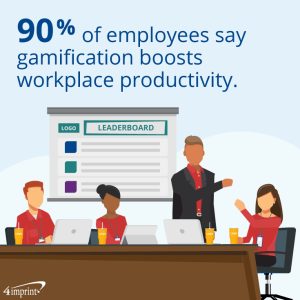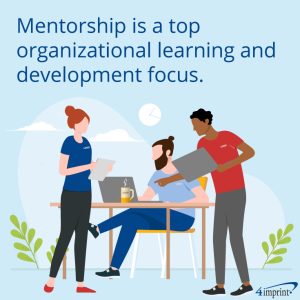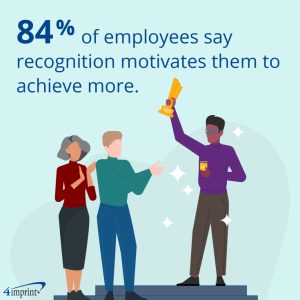Research from south of the border shows that organizations that invest in comprehensive training and education have a 24% higher profit margin than those that don’t (or spend less). Here in Canada, just 33% of organizations report measuring how their training efforts impact the bottom line. It’s well worth measuring because companies that prioritize and provide professional development opportunities enjoy 58% greater retention and 24% higher productivity.
The beginning of a new year is about more than just setting new professional goals. It’s about sticking with them throughout the year and crushing them! The right strategies coupled with employee incentive gifts will help your team easily knock out one after another.
Gamify it
In one survey, 90% of team members said gamification boosts workplace productivity.

Gamify the professional development process to keep team members motivated. Offer digital badges for achieving small professional development goals throughout the year. Share these badges on social media and in the company newsletter, providing greater recognition and a sense of accomplishment.
Implement a system where employees earn wooden nickels for meeting milestones—for instance, completing a training course or earning a certification. Accumulated wooden nickels can be exchanged for prizes, including vacuum mugs, duffel bags and portable speakers.
Assign mentors
Mentors can provide holistic guidance, one-on-one training and more to help mentees meet and exceed their professional goals. According to a LinkedIn® 2023 Workplace Learning Report, mentorship topped the list of program focus areas, above DEI, upskilling and reskilling, and employee wellness [pdf].

Incorporate peer mentorship into the onboarding process, and pair new hires with experienced team members. Strengthen the mentor-mentee bond by providing matching productivity gifts, like journals, stylus pens and coffee mugs, to use during meetups.
Host an internal annual mentorship fair (similar to a networking event) where potential mentors and mentees can gather in an informal setting and learn about each other’s skill sets. Equip participants with magnet-back name tags or lanyards with cards to make each individual easily identifiable.
Cover hard and soft skills
According to a survey of workers, occupation-specific credentials and licenses, as well as technology and computer training, were the most desired hard skills to add to their list of qualifications. Critical thinking, managerial leadership, communication and problem-solving were listed as the most desired soft skills.
Offer a comprehensive course or webinar focusing on in-demand hard skills. Download the course materials or webinar slides on flash drives so participants can keep what they learned fresh in their minds.
Introduce role-playing to help develop critical thinking and leadership skills. Or do weekly brain exercises to hone problem-solving. For instance, set a timer and challenge team members to see how far they can get solving a puzzle cube. Every week, shorten the time to create an even bigger challenge.
To complement a training offering on different communication styles, give out magnetic message boards. Encourage team members to draw visuals and write text to address varied ways of communicating and learning.
Set trackable goals
Specific goals that challenge a person are 90% more likely to be completed than nonspecific ones—even those that are easier to accomplish. Help team members set clear, trackable goals that are challenging enough to motivate them yet not overwhelmingly difficult.
Keep employees accountable to their goals by mapping out a plan and tracking progress. Research shows that people who plan with paper calendars typically use a big-picture perspective that results in a higher-quality plan and greater likelihood of accomplishment. For team members who enjoy paper versus digital planning tools, provide desk pad calendars or monthly planners.
The same study discovered that when people using a digital planner take a broader perspective, their plan quality increases as well. For team members who prefer a paperless approach, refer them to a digital platform or app designed for setting and tracking big-picture goals.
Recognize achievements
Nearly 84% of team members say recognition motivates them to achieve more.

Host a luncheon to celebrate professional development achievements. Award team members with stunning crystal awards. Snap photos of individuals holding their awards, and share them on a bulletin board in the breakroom and on social media.
When team members complete two or more major professional development goals, reward them with an extra vacation day or tickets to a nearby attraction. Check in regularly with each team member to see how they’re progressing. If someone falls behind, find out what they need to get back on track. Acknowledge their efforts to stay on track by giving them a tea assortment and silicone tea bag, or a luxurious loofah and waffle weave robe.
Propel professional growth
With the right strategies and employee incentive gifts, you can help team members turn their professional development goals from a to-do list into a “done” list. From gamifying the grind to assigning mentors to setting trackable goals, your team will crush their professional development plans!
Trademark
LinkedIn is a registered trademark of LinkedIn Corporation 1000 W. Maude Avenue Sunnyvale, CALIFORNIA UNITED STATES 94085.
